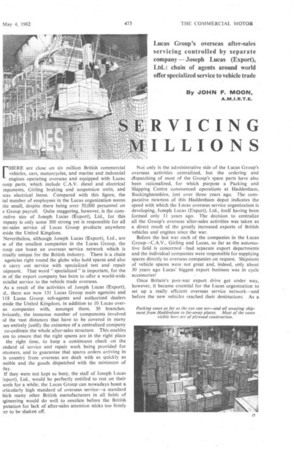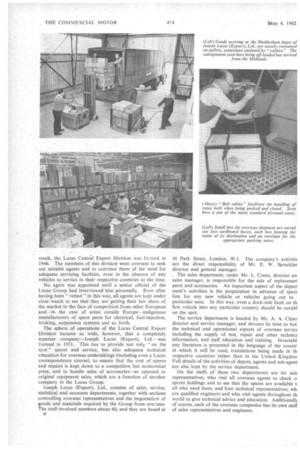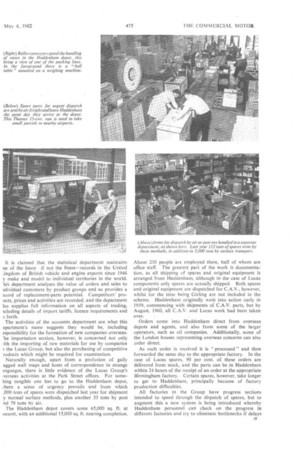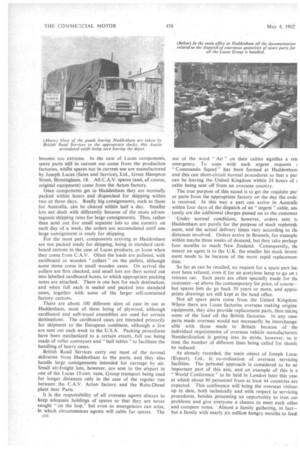ERVICING ILLIONS
Page 119

Page 120

Page 121

Page 122

If you've noticed an error in this article please click here to report it so we can fix it.
By JOHN F. MOON, rHERE are close on six million British commercial vehicles, cars, motorcycles, and marine and industrial engines operating overseas and equipped with Lucas roup parts, which include C.A.V. diesel and electrical mponents, Girling braking and suspension units, and teas electrical items. Compared with this figure, the tal number of employees in the Lucas organization seems lite small, despite there being over 50,000 personnel on e Group payroll. Quite staggering, however, is the comTative size of Joseph Lucas (Export), Ltd., for this mpany is only some 300 strong yet is responsible for all ter-sales service of Lucas Group products anywhere aside the United Kingdom.
Nevertheless, although Joseph Lucas (Export), Ltd., are ie of the smallest companies in the Lucas Group, the roup can boast an overseas service network which is rtually unique for the British industry. There is a chain agencies right round the globe who hold spares and also n carry out service with specialized test and repair pipment. That word " specialized " is important, for the m of the export company has been to offer a world-wide ecialist service to the vehicle trade overseas.
As a result of the activities of Joseph Lucas (Export), .d., there are now 131 Lucas Group main agencies and 118 Lucas Group sub-agents and authorized dealers aside the United Kingdom, in addition to 10 Lucas overas companies with, amongst them, 30 branches. bviously, the immense number of components involved id the vast distances that have to be covered in many .ses entirely justify the existence of a centralized company co-ordinate the whole after-sales structure. This enables em to ensure that the right spares are in the right place the right time, to keep a continuous check on the indard of service and repair, work being provided for istomers, and to guarantee that spares orders arriving in is country from overseas are dealt with as quickly as nsible and the goods dispatched with the minimum of :lay.
If they were not kept so busy, the staff of Joseph Lucas /(port), Ltd., would be perfectly entitled to rest on their urels for a while; the Lucas Group can nowadays boast a irticularly high standard of overseas service—a standard hich many other British manufacturers in all fields of igineering would do well to emulate before the British putation for lack of after-sales attention sticks too firmly ,er to be shaken off.
Not only is the administrative side of the Lucas Group's overseas activities centralized, but the ordering and dispatching of most of the Group's spare parts have also been rationalized, for which purpose a Packing and Shipping Centre commenced operations at Haddenham, Buckinghamshire, just over three years ago. The comparative newness of this Haddenham depot indicates the speed with which the Lucas overseas service organization is developing, Joseph Lucas (Export), Ltd., itself having been formed only 11 years ago. The decision to centralize all the Group's overseas after-sales activities was taken as a direct result of the greatly increased exports of British vehicles and engines since the war.
Before the last war each of the companies in the Lucas Group—C.A.V., Girling and Lucas, so far as the automotive field is concerned —had separate export departments and the individual companies were responsible for supplying spares directly to overseas companies on request Shipment of vehicle spares were not great and, indeed, only about 30 years ago Lucas' biggest export business was in cycle accessories?
Once Britain's post-war export drive got under way, however, it became essential for the Lucas organization to set up a really efficient overseas service network—and before the new vehicles reached their destinations. As a result, the Lucas CentrI Export Division was formed in 1946. The members of this division went overseas to seek out suitable agents and to convince them of the need for adequate servicing facilities, even in the absence of any vehicles to service in their respective countries at the time.
No agent was appointed until a senior official of the Lucas Group had interviewed him personally. Even after having been "vetted "in this way, all agents are kept under close watch to see that they are getting their fair share of the market in the face of competition from other European and—in the case of areas outside Europe—indigenous manufacturers of spare parts for electrical, fuel-injection, braking, suspension systems and so forth.
The sphere of operations of the Lucas Central Export Division became so wide, however, that a completely separate company—Joseph Lucas (Export), Ltd.—was formed in 1951. This has to provide not only "on the spot" spares and service, but also adequate technical education for overseas undertakings (including even a Lucas correspondence course), to ensure that the cost of spares and repairs is kept down to a competitive but economical price, and to handle sales of accessories—as opposed to original equipment sales, which are a -function of another company in the Lucas Group.
Joseph Lucas (Export), Ltd., consists of sales, service, statistical and accounts departments, together with sections controlling overseas representatives and the importation of goods and materials required by the Group from overseas. The staff involved numbers about 60, and they are based at 38 46 Park Street, London, W.1. The company's activitie are the direct responsibility of Mr. E. W. Sprackler director and general manager.
_ The sales department, under Mr. L. Crane, director an sales manager, is responsible for the sale of replacerner parts and accessories. An important aspect of the depari ment's activities is the preparation in advance of spare lists for any new vehicle or vehicles going out to particular area. In this way, even a dock-side fault on th first vehicle into any particular country should be curabl on the spot.
The service department is headed by Mr. A. A. Chinr director and service manager, and devotes its time to bot the technical and operational aspects of overseas servict including the supply of test, repair and other technica information, and staff education and training. Invariabl any literature is presented in the language of the countr in which it will be used, translations being made in th respective countries rather than in the United Kingdorr Full details of the activities of depots, agents and sub-agent are also kept by the service department.
On the staffs of these two departments are six sale representatives, who visit all overseas agents to check o spares holdings and to see that the spares are available t all who need them, and four technical representatives, MI are qualified engineers and who visit agents throughout th world to give technical advice and education. Additionall} of course, each of the overseas companies has its own staff of sales representatives and engineers.
It is claimed that the statistical department maintains ne of the finestif not the finest—records in the United ...ingdorn of British vehicle and engine exports since 1946 y make and model to individual territories in the world. his department analyses the value of orders and sales to idividual customers by product groups and so provides a !cord of replacement-parts potential. Competitors' proucts, prices and activities are recorded, and the department lso supplies full information on all aspects of trading, tcluding details of import tariffs, licence requirements and 3 forth.
The activities of the accounts department are what this epartment's name suggests they would be, including . 7.,sponsibility for the formation of new companies overseas. "he importation section, however, is concerned not only pith the importing of raw materials for use by companiel the Lucas Group, but also the purchasing of competitive roducts which might be required for examination.
Naturally enough, apart from a profusion of gaily agged wall maps and hosts of correspondence in strange inguages, there is little evidence of the Lucas Group's verseas activities at the Park Street offices. For somehing tangible one has to go to the Haddenham depot, there a sense of urgency prevails and from which ,000 tons of spares were dispatched last year for shipment y normal surface methods, plus another 33 tons by post nd 79 tons by air.
The Haddenham depot covers some 65,000 sq. ft. at ■ resent, with an additional 15,000 sq. ft. nearing completion. About 200 people are employed there, half of whom are office staff. The greatest part of the work is documentation, as all shipping of spares and original equipment is arranged from Haddenham, although in the case of Lucas components only spares are actually shipped. Both spares and original equipment are dispatched for C.A.V., however, whilst for the time being Girling are not included in the scheme. Haddenham originally went into action early in 1959, commencing with shipments of C.A.V. parts, but by August, 1960, all C.A.V. and Lucas work had been taken over. • Orders come into Haddenham direct from overseas depots and agents, and also from some of the larger operators, such as oil companies. Additionally, some of the London houses representing overseas concerns can also order direct.
As each order is received it is "processed " and then forwarded the same day to the appropriate factory. In the case of Lucas spares, 90 per cent, of these orders are delivered from stock, and the parts can be in Haddenham within 24 hours of the receipt of an order' at the appropriate Birmingham factory. Certain spares, however, take longer to get to Haddenham, principally because of factory production difficulties.
All factories in the Group have progress sections intended to speed through the dispatch of spares, but to augment this a new system is being introduced whereby Haddenham personnel can check on the progress in different factories and try to eliminate bottlenecks if delays become too extreme. In the case of Lucas components, spare parts still in current use come from the production factories, whilst spares not in current use are manufactured by Joseph Lucas (Sales and Service), Ltd., Great Hampton Street, Birmingham, 18. All C.A.V. spares (and, of course, original equipment) come from the Acton factory.
Once components get to Haddenham they are normally packed within hours and dispatched for shipping within two or three days. Really big consignments, such as those for Australia, can be cleared within half a day. Smaller lots are dealt with differently because of the more advantageous shipping rates for large consignments. Thus, rather than send out five small separate lots to one country on each day of a week, the orders are accumulated until one large consignment is ready for shipping.
For the most part, components arriving at Haddenham are not packed ready for shipping, being in standard cardboard cartons in the case of Lucas products, or loose when they come from C.A.V. Often the loads are palleted, with cardboard or wooden " collars " on the pallets, although some items come in small wooden cases. On arrival the collars are first checked, and small lots are then sorted out into labelled cardboard boxes, to which appropriate packing notes are attached. There is one box for each destination, and when full each is sealed and packed into standard cases, together with some of the larger self-contained factory cartons.
There are about 100 different sizes of case in use at Haddenham, most of these being of plywood, although cardboard and soft-wood assemblies are used for certain destinations. The cardboard cases are intended primarily for shipment to the European continent, although a few are sent out each week to the U.S.A. Packing procedures have been mechanized to a certain extent, full use being made of roller conveyors and "ball tables "to facilitate the handling of heavy cases.
British Road Services carry out most of the normal deliveries from Haddenham to the ports, and they also handle large consignments intended for carriage by air. Small air-freight lots, however, are sent to the airport in one of the Lucas 15-cwt. vans, Group transport being used for longer distances only in the case of the regular run between the C.A.V. Acton factory and the Rob-Diesel plant near Paris.
It is the responsibility of all overseas agents always to keep adequate holdings of spares so that they are never caught "on the hop," but even so emergencies can arise, in which circumstances agents will cable for spares. The 0 use ot the word " Air " on their cables signifies a rea emergency. To cope with such urgent requests "Commando Squad" has been formed at Haddenham and this can short-circuit normal procedures so that a par can be leaving the United Kingdom within 24 hours of ; cable being sent off from an overseas country.
The true purpose of this squad is to get the requisite par or parts from the appropriate factory on the day the orde is received. In this way a part can arrive in Austrafil within four days of the dispatch of an " urgent " cable, am rarely are the additional charges passed on to the customet Under normal conditions, however, orders sent tc Haddenham are purely for the purpose of stock replenish ment, and the actual delivery times vary according to tha distances involved. Orders arrive in Brussels, for example within maybe three weeks of demand, but they take perhar four months to reach New Zealand. Consequently, till( nearer an agent is to the U.K. the smaller his stock invest ment needs to be because of the more rapid replacemen time.
So far as can be recalled, no request for a spare part ha: ever been refused, even if for an acetylene lamp to go on E
veteran car. Such parts are often specially made for tilt customer—at above the contemporary list price, of course— but spares lists do go back 50 years or more, and appro. priate drawings are still kept at the head office.
Not all spare parts come from the United Kingdom Where there are Lucas factories overseas making origina equipment, they also provide replacement parts, thus taking some of the load off the British factories. In any case parts made overseas would not necessarily be interchange.
able with those made in Britain because of thc individual requirements of overseas vehicle manufacturers Standardization is getting into its stride, however, so ir time the number of different lines being called for shoulc be reduced.
As already recorded, the Main object of Joseph Luca! (Export), Ltd., is co-ordination of overseas servicing facilities. The personal approach is considered to be ar important part of this aim, and an example of this is a "World Conference" to be held in London later this yea] at which about 90 personnel from at least 44 countries art expected. This conference will bring the overseas visitor: up to date, both technically and with respect to servicing
procedures, besides presenting an opportunity to iron out problems and give everyone a chance to meet each othei .and compare notes. Almost a family gathering, in fact— but a family with nearly six million hungry mouths to feed


































































































































































































































































